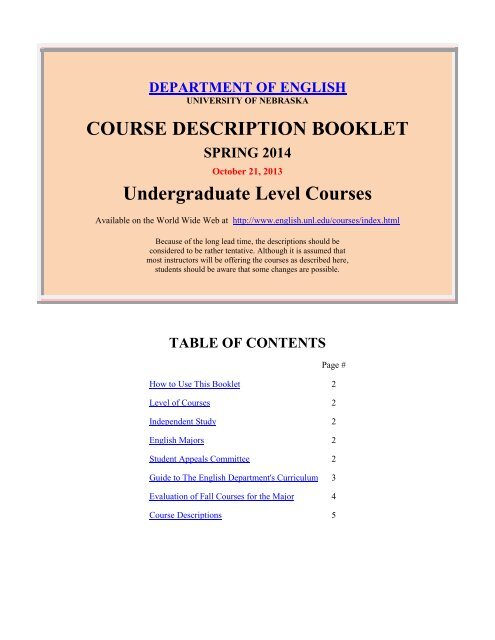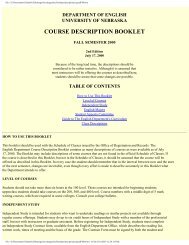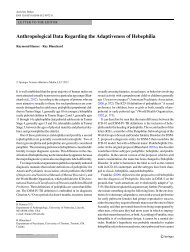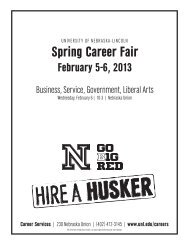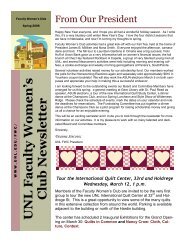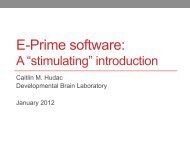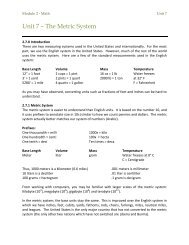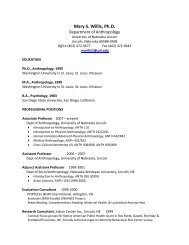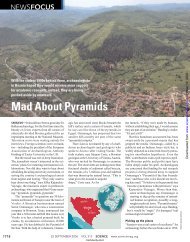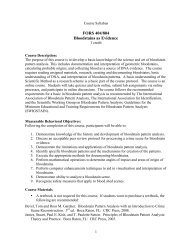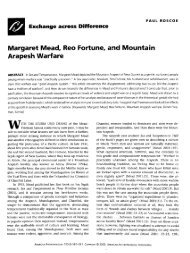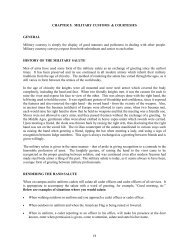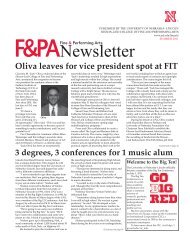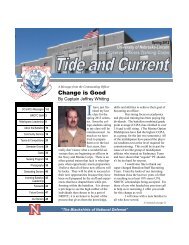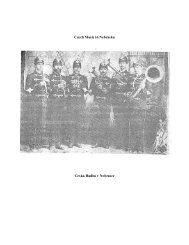COURSE DESCRIPTION BOOKLET Undergraduate Level Courses
COURSE DESCRIPTION BOOKLET Undergraduate Level Courses
COURSE DESCRIPTION BOOKLET Undergraduate Level Courses
You also want an ePaper? Increase the reach of your titles
YUMPU automatically turns print PDFs into web optimized ePapers that Google loves.
DEPARTMENT OF ENGLISH<br />
UNIVERSITY OF NEBRASKA<br />
<strong>COURSE</strong> <strong>DESCRIPTION</strong> <strong>BOOKLET</strong><br />
SPRING 2014<br />
October 21, 2013<br />
<strong>Undergraduate</strong> <strong>Level</strong> <strong>Courses</strong><br />
Available on the World Wide Web at http://www.english.unl.edu/courses/index.html<br />
Because of the long lead time, the descriptions should be<br />
considered to be rather tentative. Although it is assumed that<br />
most instructors will be offering the courses as described here,<br />
students should be aware that some changes are possible.<br />
TABLE OF CONTENTS<br />
Page #<br />
How to Use This Booklet 2<br />
<strong>Level</strong> of <strong>Courses</strong> 2<br />
Independent Study 2<br />
English Majors 2<br />
Student Appeals Committee 2<br />
Guide to The English Department's Curriculum 3<br />
Evaluation of Fall <strong>Courses</strong> for the Major 4<br />
Course Descriptions 5
HOW TO USE THIS <strong>BOOKLET</strong><br />
This booklet should be used with the Schedule of Classes issued by the Office of Registration and Records. The<br />
English Department Course Description Booklet contains as many descriptions of courses as were available as of<br />
October 21, 2013. The Booklet may include descriptions of some courses that are not found in the official<br />
Schedule of Classes. If the course is described in this Booklet, but not in the Schedule of Classes, it should be<br />
assumed that the course will be offered as described in this Booklet. In every case the student should remember<br />
that in the interval between now and the start of the next semester, changes are inevitable, even though every<br />
effort is made to describe accurately in this Booklet what the Department intends to offer.<br />
LEVEL OF <strong>COURSE</strong>S<br />
Students should not take more than six hours at the 100 level. These courses are intended for beginning students;<br />
upperclass students should take courses on the 200, 300, and 400 level. Course numbers with a middle digit of 5<br />
mark writing courses, which are required in some colleges. Consult your college bulletin.<br />
INDEPENDENT STUDY<br />
Independent Study is intended for students who want to undertake readings or similar projects not available<br />
through regular course offerings. Students may do up to six credit hours of Independent Study with a member of<br />
the professorial staff. Before registering for Independent Study, students must complete an Independent Study<br />
Contract form, available from the English Advising Office, 201 Andrews, which describes the reading list, written<br />
work, times of meeting and the basis of the grade. The Contract Form must be signed by both the student and the<br />
supervising professor and a copy submitted to the Chief Advisor for department records. The student may then<br />
obtain the class number for the appropriate Independent Study course -- 199, 299, 399, 399H, or 497. The<br />
registration of any student who has not filed the contract with the Chief Advisor by the end of Drop/Add period<br />
will be canceled.<br />
ENGLISH MAJORS<br />
All Arts & Sciences College English majors (including double majors) should see their advisors every semester.<br />
For further information see the Chief Advisor, in Andrews 201.<br />
STUDENT APPEALS COMMITTEE<br />
Students wishing to appeal a grade may address their grievances to the Department of English Appeals<br />
Committee. Under ordinary circumstances, students should discuss problems with their teachers before<br />
approaching the Committee. Inquire in the English department main office, Andrews 202, for the name and office<br />
of the Appeals Committee chair.<br />
Students may inform the Chair of the Department, Andrews 204A, of cases where the content of courses<br />
materially differs from the description printed in the Course Description Booklet. Questions or complaints<br />
concerning teachers or courses should also be addressed to the Chair of the Department.<br />
The University of Nebraska-Lincoln is a public university committed to providing a quality education to a diverse<br />
student body. It is the policy of the University of Nebraska-Lincoln not to discriminate based on gender, age,<br />
disability, race, color, religion, marital status, veteran's status, national or ethnic origin, or sexual orientation. This<br />
policy is applicable to all University administered programs including educational programs, financial aid,<br />
admission policies and employment policies.<br />
Complaints, comments, or suggestions about these policies should be addressed to the Chair of the Department.<br />
2 – UNL DEPARTMENT OF ENGLISH, SPRING 2014
GUIDE TO THE ENGLISH DEPARTMENT'S CURRICULUM<br />
The English Department offers a great many courses, more than are listed by title in the University Bulletin.<br />
These include courses in British and American literature, women's literature, other literatures in English, some<br />
literatures in translation, minority literatures, composition, creative writing, linguistics, film, popular literature,<br />
and English as a Second Language.<br />
Knowing something about the organization of the curriculum may help majors or non-majors who are trying to<br />
find courses. The numbering system provides some guidance, first by levels:<br />
<strong>Courses</strong> numbered from 100 to 151 are first-year composition courses.<br />
English 180 and 200-level courses are considered entry-level courses, for majors and non-majors alike.<br />
300-level courses are historical surveys of literature, advanced author courses, or advanced writing or rhetoric or<br />
linguistics courses.<br />
4/800-level courses are combined senior/graduate classes and are more professional in their approach.<br />
The numbering system provides additional guidance to types of courses. For example, middle-digit 5 courses, like<br />
150, 252, 354, are all writing courses, including creative writing. Here is a quick guide to the numbering system:<br />
A middle digit of "0" indicates courses in types of literature, such as short story (303), poetry (202), drama<br />
(4/801), or fiction (205).<br />
A middle digit of "1" indicates special thematic courses or courses examining literature in relation to particular<br />
issues (several women's literature courses, Plains Literature, Illness and Health in Literature, for example).<br />
A middle digit of "2" indicates language and linguistics courses.<br />
A middle digit of "3" indicates courses focusing on authors (Shakespeare, The Brontës, Major American<br />
Authors).<br />
A middle digit of "4" indicates ethnic minority courses, courses in translation, and courses that represent literature<br />
written in English in countries other than the United States and Britain (Judeo-Christian Literature, Canadian<br />
Literature, African-American Literature, for example).<br />
A middle digit of "5" indicates creative writing or composition courses.<br />
A middle digit of "6" indicates a historical survey of literature.<br />
A middle digit of "7" indicates courses in criticism, theory, rhetoric (Literary/Critical Theory, Film Theory and<br />
Criticism).<br />
A middle digit of "8" indicates interdisciplinary courses (Contemporary Culture).<br />
A middle digit of "9" indicates special and professional courses.<br />
Note: Film courses are spread throughout the numbering system, by analogy with literature courses. Thus Writing<br />
for Film and TV is numbered 259; Film Directors, 239; and so on.<br />
The practical lesson from this numbering system is that if you find one course that interests you, you may be able<br />
to find others by looking for similar numbers at different levels. As may be clear from these examples, there is a<br />
lot of repetition in the English Department curriculum. (Anyone interested in a list of English courses by<br />
categories can obtain one from the Chief Advisor in 201 Andrews Hall.)<br />
UNL DEPARTMENT OF ENGLISH, SPRING 2014 – 3
<strong>COURSE</strong> <strong>DESCRIPTION</strong>S<br />
First-year English .................................................. 5<br />
Engl 100- Career Planning for English Majors ..... 7<br />
Engl 200 - Intro Engl Studies ................................ 7<br />
Engl 200H - Intro to Engl Studies ......................... 7<br />
Engl 202A - Intro to Poetry ................................... 8<br />
Engl 205 - 20th Century Fiction ............................ 8<br />
Engl 206 - Science Fiction .................................... 8<br />
Engl 208 - The Mystery & the Gothic Tradition ... 9<br />
Engl 212 - Intro Lesbian & Gay Lit ...................... 9<br />
Engl 215 - Intro Womens Lit ................................. 9<br />
Engl 216 - Children's Literature .......................... 10<br />
Engl 219 - Film Genre -- "Comic Book and Rock<br />
and Roll Movies" .............................................. 10<br />
Engl 230 - Engl Authors to 1800 ......................... 11<br />
Engl 230A - Shakespeare .................................... 11<br />
Engl 231 - Brit Authors since 1800 ..................... 12<br />
Engl 239 - Film Directors -- "Women Filmmakers"<br />
.......................................................................... 12<br />
Engl 243 - National Literatures -- "The invention of<br />
modern South Africa: Literature, Film, culture"13<br />
Engl 244 - African-American Lit since 1865 ...... 13<br />
Engl 245N - Intro to Native American Lit .......... 13<br />
Engl 252 - Intro Fiction Writing .......................... 14<br />
Engl 253 - Intro Writing Poetry ........................... 15<br />
Engl 254 - Writing&Communities ...................... 15<br />
Engl 260 - American Lit before 1865 .................. 16<br />
Engl 261 - American Lit since 1865 .................... 17<br />
Engl 270 - Literary/Critcl Thry ........................... 17<br />
Engl 301B - Twentieth- Century Drama ............ 17<br />
Engl 305A - Novel 1700-1900 ........................... 17<br />
Engl 315A - Survey Womens Lit ....................... 18<br />
Engl 315B - Women in Pop Culture ................... 18<br />
Engl 317 - Lit & Environment ............................ 19<br />
Engl 322B - Linguistics & Soc ........................... 19<br />
Engl 331 - British Authors since 1800 -- "Victorian<br />
Novelists" ......................................................... 19<br />
Engl 341 - The Bible as Lit................................. 19<br />
Engl 344 - Ethnicity & Film ............................... 20<br />
Engl 345N - Native American Women Writers .. 20<br />
Engl 349 - National Cinemas -- "World Cinema"21<br />
Engl 352 - Intermediate Fiction Writing ............ 22<br />
Engl 353 - Intermediate Poetry Writing ............. 22<br />
Engl 354 - Writing: Literacy............................... 22<br />
Engl 355 - Editing and the Publishing Industry .. 22<br />
Engl 376 - Rhetoric Argumnt&Soc .................... 22<br />
Engl 405E - Modern Fiction ............................... 23<br />
Engl 405N - American Novel II ......................... 24<br />
Engl 410 - Literary Movements .......................... 25<br />
Engl 440 – Classical Drama ............................... 26<br />
Engl 452 - Fiction Writing .................................. 26<br />
Engl 475 - Rhetoric ............................................. 26<br />
Engl 478 - Electronic Texts ................................ 26<br />
Engl 487 - Engl Capstone Exprnc ...................... 27<br />
Engl 495 – Internship in Digital Humanities -- "DH<br />
Practicum" ........................................................ 28<br />
Engl 498 - Sp Topics: English -- ........................ 28<br />
4 – UNL DEPARTMENT OF ENGLISH, SPRING 2014
FIRST-YEAR ENGLISH<br />
NOTE: 100-level English courses will be open only to freshman and sophomore students. Students in Arts<br />
and Sciences who have not completed the Communication requirement and have 65 credit hours or more should<br />
choose English 254 or 354 (or both) to complete this requirement. (In unusual cases, exceptions to this rule may<br />
be granted by the Chief Advisor, English Department.) Advanced students in other colleges who want or need a<br />
composition course should also choose 254 or 354.<br />
English 101, including ethnic and honors variations, English 150, and English 151 are first-year English<br />
composition courses, designed to help students improve their writing by study and practice. Since reading and<br />
writing are closely related, several of the courses involve reading, and students can expect to do a substantial<br />
amount of writing — some formal, some informal, some done in class and some at home. Ordinarily students take<br />
100-level courses in the first year.<br />
Students registered in the College of Arts & Sciences are required to take any two of the following courses.<br />
Students in other colleges should check their college's bulletin or with an advisor, since different colleges have<br />
different requirements.<br />
NOTE: English 101, 150 and 151, including honors variations, are self-contained courses. They are not<br />
designed to be taken in any particular sequence.<br />
English 101 — Writing: Rhetoric & Reading<br />
This is a first-year English composition course that focuses on composing practices and critical reading strategies<br />
through the analysis of literature. Students can expect to produce the equivalent of 25 double-spaced pages of<br />
polished prose (a minimum of three writing projects) during the semester. The kinds of writing may vary from<br />
section to section, but all sections assume that reading and writing well are closely connected. This course is<br />
recommended for students who wish to improve their writing and reading skills through the study of literature.<br />
English 101H — Honors Writing: Rhetoric & Reading<br />
NOTE: This course is intended for students who have had significant prior experience and success in English<br />
classes. Admission is by invitation or application only. See the Department of English Chief Advisor, Andrews<br />
123A, for more information. This course shares the same focus and goals as English 101 and requires an<br />
equivalent amount of reading and writing.<br />
English 150 — Writing: Rhetoric as Inquiry<br />
This is a first-year English composition course that engages students in using writing and rhetorical concepts such<br />
as purpose, audience, and context to explore open questions — to pose and investigate problems that are<br />
meaningful in their lives and communities. Students can expect to produce the equivalent of 25 double-spaced<br />
pages of polished prose (a minimum of three writing projects) during the semester. This course is recommended<br />
for students who wish to improve their writing, reading and inquiry skills (such as learning to identify relevant<br />
and productive questions, learning to synthesize multiple perspectives on a topic, etc.)<br />
English 150H — Honors Writing: Rhetoric as Inquiry<br />
This course is intended for students who have had significant prior experience and success with English classes<br />
and/or contexts that require writing, revision and analysis. Admission is by invitation or application only. Contact<br />
the Department of English Chief Advisor for more information. This course shares the same focus and goals as<br />
English 150 and requires an equivalent amount of reading and writing.<br />
UNL DEPARTMENT OF ENGLISH, SPRING 2014 – 5
English 151 — Writing: Rhetoric as Argument<br />
This is a first-year English composition course that engages students in the study of written argument: developing<br />
an informed and committed stance on a topic, and using writing to share this stance with particular audiences for<br />
particular purposes. Students can expect to produce the equivalent of 25 double-spaced pages of polished prose (a<br />
minimum of three writing projects) during the semester. This course is recommended for students who wish to<br />
improve their writing and reading skills through the study and practice of argument.<br />
English 151H — Honors Rhetoric as Argument<br />
This course is intended for students who have had significant prior experience and success with English classes<br />
and/or contexts that require writing, revision and analysis. Admission is by invitation or application only.<br />
Contact the Department of English Chief Advisor for more information. This course shares the same focus and<br />
goals as English 151 and requires an equivalent amount of reading and writing.<br />
English 180 — Introduction to Literature<br />
NOTE: This course does not fulfill any part of the freshman composition requirement in the College of Arts and<br />
Sciences.<br />
This course is intended to introduce first and second-year students to examination of reading, especially the<br />
reading of literature. In order to examine the process of reading, students can expect to explore literary works<br />
(poems, stories, essays, and drama), some works not usually considered literary, and the students' own reading<br />
practices. The course will deal with such questions as how do we read, why do we read, and what is literature and<br />
what are its functions.<br />
English 140 — Advanced Academic Writing & Usage<br />
English 141 — Advanced Academic Reading<br />
English 142 — Advanced Academic Listening & Speaking Skills<br />
English 186 — English as a Second Language/Language Skills (3 credits)<br />
English 187 — English as a Second Language/Introduction to Writing (3 credits)<br />
English 188 — English as a Second Language/Advanced Communication Skills (3 credits)<br />
NOTE: Admission to these courses is by placement examination required of all newly admitted non-native<br />
speakers. See the Coordinator of ESL Program, Michael Harpending, Nebraska Hall Rm. 513E, for more<br />
information.<br />
English 188 applies to the composition requirement in Arts and Sciences, and in some other colleges.<br />
6 – UNL DEPARTMENT OF ENGLISH, SPRING 2014
ENGL 100- CAREER PLANNING FOR ENGLISH MAJORS<br />
Time Days Sec Faculty Class#<br />
1100-1215 T 001 Payne, K 22557<br />
Course Description and Objectives: This course is an elective orientation course that serves students early on in<br />
the English major. It may be taken Pass/no pass only.<br />
In this course we will survey career options for students majoring in English and develop individualized plans for<br />
the undergraduate experience and beyond. Our readings will be broad and varied but all will examine the value of<br />
a liberal arts/humanities degree, identify employable skills, and research relevant experiences during the<br />
undergraduate years. Assignments will be designed to prepare students for the job search and to recognize the<br />
value of a liberal arts education for civic life in today’s global economy. Class sessions will involve short lectures,<br />
discussions, and group work.<br />
Assignments:<br />
Short and Long Term Professional Development Plan<br />
Degree Completion Plan<br />
Reading Responses<br />
Academic Resume<br />
Internship Application or Job Cover Letter<br />
Group Presentation<br />
ENGL 200 - INTRO ENGL STUDIES<br />
Time Days Sec Faculty Class#<br />
0930-1020a MWF 001 Staff 3254<br />
Note: Open to Engl majors and minors<br />
ENGL 200H - INTRO TO ENGL STUDIES<br />
Further information unavailable at this time<br />
Time Days Sec Faculty Class#<br />
1100-1215p TR 001 Gailey, A 9960<br />
NOTE: Good standing in the University Honors Program or by invitation<br />
Aim<br />
This class will introduce students to the field of English Studies, in particular how it is practiced at the University<br />
of Nebraska. We will study a range of texts and methods, and will complete a variety of assignments, including a<br />
digital project. Throughout the course, we will ask questions about what English Studies is and is not, what it<br />
means to be an author, a reader, and a critic, and how we deem some material literary and canonical, considering<br />
multiple critical perspectives, periods, and forms.<br />
Teaching<br />
Class discussion, lecture, small group discussion, visiting speakers, hands-on work<br />
UNL DEPARTMENT OF ENGLISH, SPRING 2014 – 7
Requirements<br />
Reading fiction, poetry, and nonfiction; written and digital projects; regular quizzes<br />
Tentative Reading<br />
This is *very* tentative and will almost certainly change: a play by Shakespeare, poetry by Whitman and<br />
Dickinson, a novel by David Miller, a film by Bergman, many critical sources distributed online<br />
ENGL 202A - INTRO TO POETRY<br />
Time Days Sec Faculty Class#<br />
1230-0145p TR 001 Vespa, J 4608<br />
Aim: This course will explore poetry in terms of a poet's idiom and sensibility, with attention to the literary<br />
forms, genres, and modes that poets have used over the last two millennia. In doing so, we will discuss poets<br />
ranging from the classical Roman poet Virgil to contemporary poets writing today.<br />
Teaching: Class sessions will vary in format, featuring a mix of lecture, discussion, and small group work.<br />
Requirements: Course work will include a mix of essays and presentations, along with active participation in<br />
class discussion.<br />
Tentative Reading: The Norton Anthology of Poetry<br />
ENGL 205 - 20TH CENTURY FICTION<br />
Time Days Sec Faculty Class#<br />
1230-0145p TR 001 Staff 4321<br />
0600-0850p W 101 Staff 4230<br />
ENGL 206 - SCIENCE FICTION<br />
Staff - 001<br />
Further information unavailable at this time<br />
Staff - 101<br />
Further information unavailable at this time<br />
Time Days Sec Faculty Class#<br />
0130-0220p MWF 001 Staff 4852<br />
0830-0920a MWF 002 Staff 4853<br />
ARR-ARRp ARR 900 Staff 22407<br />
Staff - 001<br />
Further information unavailable at this time<br />
Staff - 002<br />
Further information unavailable at this time<br />
8 – UNL DEPARTMENT OF ENGLISH, SPRING 2014
Staff - 900<br />
Further information unavailable at this time<br />
ENGL 208 - THE MYSTERY & THE GOTHIC TRADITION<br />
Time Days Sec Faculty Class#<br />
1130-1220p MWF 001 Staff 4854<br />
0930-1045a TR 002 Staff 17418<br />
ENGL 212 - INTRO LESBIAN & GAY LIT<br />
Staff - 001<br />
Further information unavailable at this time<br />
Staff - 002<br />
Further information unavailable at this time<br />
Time Days Sec Faculty Class#<br />
0200-0315p TR 001 Staff 9981<br />
Aim:<br />
Teaching Method:<br />
Requirements:<br />
Tentative Reading List:<br />
ENGL 215 - INTRO WOMENS LIT<br />
Time Days Sec Faculty Class#<br />
0200-0315p TR 001 Honey, M 3255<br />
ARR-ARRp ARR 900 Staff 22408<br />
Honey, M - 001<br />
Course Description: This course will cover a variety of women writers, primarily from the early twentieth<br />
century up to the present day and primarily American, as a lens through which to view the field of Women’s<br />
Literature. The reading list is ethnically diverse and also represents women of different social/economic groups,<br />
geographic regions, and affectional preferences. This reflects the huge variation encompassed by the word<br />
“women.” One prominent theme of the course will be girls and young women coming of age. Students’ individual<br />
responses to the texts will be at the heart of this course. Although I will provide the class with historical and<br />
critical frameworks that shape our understanding of these writers, it is the students’ interaction with them that will<br />
form the basis of our discussions.<br />
Teaching Method: Discussion, small group work, student presentations, and extensive writing by students.<br />
Requirements: One oral presentation on a woman writer; three 4-6 page papers. Daily attendance required.<br />
Tentative Reading List: The Awakening Kate Chopin; O Pioneers Willa Cather; The Color Purple Alice Walker;<br />
Their Eyes Were Watching God Zora Neale Hurston; The Joy Luck Club Amy Tan; American Indian Stories<br />
Zitkala-Sa; Paper Wings Marly Swick; A Gate at the Stairs Lorrie Moore.<br />
UNL DEPARTMENT OF ENGLISH, SPRING 2014 – 9
ENGL 216 - CHILDREN'S LITERATURE<br />
Staff - 900<br />
Further information unavailable at this time<br />
Time Days Sec Faculty Class#<br />
0930-1045a TR 001 Staff 4770<br />
0930-1020a MWF 002 Staff 4771<br />
Staff - 001<br />
Further information unavailable at this time<br />
Staff - 002<br />
Further information unavailable at this time<br />
ENGL 219 - FILM GENRE -- "COMIC BOOK AND ROCK AND ROLL MOVIES"<br />
Time Days Sec Faculty Class#<br />
0130-0440p T 001 Dixon, W 4137<br />
AIM OF THE <strong>COURSE</strong>: Comic book movies have been around since the 1920s, and rock and roll movies since<br />
the late 1950s, though they were once relegated to children’s matinee screenings on Saturdays as once-a-week<br />
serials and also feature films. But today, with the continuing rise of Comic-Con, they seem to be more a part of<br />
the mainstream than ever. This course will examine comic book and rock and roll movies from the past and<br />
present, and explore how these films shaped American culture in the post World War II era to the present, and<br />
how they adapted to the changing tastes and mores of succeeding generations. In addition, we’ll ask: why are<br />
comic book movies so popular, especially right now?<br />
REQUIRED TEXTS: There is no required textbook for this course. This course seeks to interrogate the limits of<br />
the rock and roll and comic book based film as a vehicle for social commentary, beyond the traditional limits<br />
ascribed the genre. Thus, since this course deals for the most part in very recent films, directed readings, sent<br />
weekly as links to students, is the most effective way to tackle the material presented here. These readings are a<br />
mandatory part of the course material, in addition to research that you will do at Love Library for the 2nd and 3rd<br />
papers for this course.<br />
REQUIREMENTS: The class requires students to produce three (3) sustained, finished papers of 5 pages<br />
minimum length each, in addition to detailed class discussion of the films we see each week, as well as directed<br />
readings on a regular basis. Attendance is mandatory for every class, and there are NO excused absences. In their<br />
papers, students will demonstrate their understanding and knowledge of film genre, how genre was formed, how it<br />
operates in terms of viewer expectations, and how genre reflects the values and aesthetics of the society in which<br />
it was created.<br />
FILM SCREENED INCLUDE: THE DARK KNIGHT, THE TAMI SHOW, CAPTAIN AMERICA: THE FIRST<br />
AVENGER, WOODSTOCK, X MEN: FIRST CLASS, GIMME SHELTER, V FOR VENDETTA, THIS IS<br />
SPINAL TAP, 300, A HARD DAY'S NIGHT, IT MIGHT GET LOUD, AKIRA and other films, all screened in<br />
class as part of the formal lecture, with running commentary throughout by the professor.<br />
NOTE: Special fee - $30.<br />
10 – UNL DEPARTMENT OF ENGLISH, SPRING 2014
ENGL 230 - ENGL AUTHORS TO 1800<br />
Time Days Sec Faculty Class#<br />
0930-1045a TR 001 Vespa, J 4199<br />
Aim: This course is the first in a two-part sequence that surveys English literature from its beginnings to the<br />
21 st century. We will read a series of works by Old English, Medieval, Early Modern (Renaissance), Restoration,<br />
and 18th-century writers, ranging from the Beowulf poet to Samuel Johnson, with an eye to discovering some of<br />
the major themes, trends, and tensions that have shaped British literature over time. Despite its broad scope, this<br />
course is not intended as an exhaustive survey, but as an opportunity for you to concentrate on a select group of<br />
authors and texts, and explore specific formal, cultural, and historical issues.<br />
Teaching: Class sessions will vary in format, featuring a mix of lecture, discussion, and small group work.<br />
Requirements: Course work will include a mix of essays and presentations, along with active participation<br />
in class discussion.<br />
Tentative Reading: The Norton Anthology of English Literature, Ninth Edition, ed. by Stephen Greenblatt et al.<br />
Volume A: The Middle Ages<br />
Volume B: The Sixteenth Century/The Early Seventeenth Century<br />
Volume C: The Restoration and the Eighteenth Century<br />
ENGL 230A - SHAKESPEARE<br />
Time Days Sec Faculty Class#<br />
0200-0315p TR 001 Staff 9990<br />
1230-0145p TR 002 Schleck, J 4246<br />
AIM:<br />
Staff - 001<br />
Further information unavailable at this time<br />
Schleck, J - 002<br />
This course will introduce you to a number of Shakespeare’s plays, focusing on those that thematize religious and<br />
“racial” difference in the early modern Mediterranean. We will spend considerable time discussing the themes,<br />
characters, language and construction of the plays as well as read some more unusual documents from<br />
Shakespeare’s time. Our goal will be to explore Shakespeare’s Mediterranean and the multicultural and<br />
multiethnic interactions which characterize both the region and the plays. In the course of the class, we will<br />
experience the tensions and the comedy of the plays through performing selected scenes, analyzing film versions<br />
of each one, and if possible, attending a live performance together.<br />
TEACHING METHOD:<br />
The course will be a mix of informal discussion/ lecture, formal student debate, group performance, and film<br />
analysis.<br />
UNL DEPARTMENT OF ENGLISH, SPRING 2014 – 11
REQUIREMENTS:<br />
One argumentative paper, one performance or film discussion/ presentation, one close reading, and a series of<br />
smaller writing assignments.<br />
TENTATIVE READING LIST:<br />
The Merchant of Venice<br />
Titus Andronicus<br />
The Tempest<br />
The Jew of Malta<br />
Scholarly articles related to the listed plays<br />
Excerpts of various Renaissance texts related to course theme<br />
ENGL 231 - BRIT AUTHORS SINCE 1800<br />
Time Days Sec Faculty Class#<br />
1100-1215p TR 001 Staff 4361<br />
Aim:<br />
Teaching Method:<br />
Requirements:<br />
Tentative Reading List:<br />
ENGL 239 - FILM DIRECTORS -- "WOMEN FILMMAKERS"<br />
Time Days Sec Faculty Class#<br />
0130-0440p W 001 Foster, G 4138<br />
Special fee - $30.<br />
Aim: This course will focus on the history of women film directors from the birth of cinema in the 1890's to the<br />
present. Women made considerable contributions to the art of filmmaking in all periods of cinema history,<br />
especially in the early days of film when there were many, many female directors. The history of women in early<br />
cinema has been neglected until very recently. One of the most interesting aspects of the class is discovering how<br />
film history in being actively rewritten to include the work of women and minority film directors. This is an<br />
exciting class in which we study the history of women as film directors and utilize feminist approaches to their<br />
work. We will study films from directors such as Alice Guy Blaché, Lois Weber, Maya Deren, Ida Lupino, Claire<br />
Denis, Lucrecia Martel, Agnes Varda, Kasi Lemmons, Sofia Coppola and many others. The course covers an<br />
international spectrum of women filmmakers; therefore we discuss nationality, race, class, sexuality, and other<br />
identity markers. This is a very exciting and unique class that covers rare films by neglected and forgotten women<br />
in film history, as well as the films of contemporary women directors.<br />
Teaching Method: Classes typically include a brief opening lecture, a film screening (with running analytical<br />
commentary), and a class discussion of the film director, her work, and her place in history. We also discuss the<br />
reading materials after we view the film. We do a significant amount of reading about women in film history,<br />
analysis of films, biographical material, and interviews with women directors. Prior knowledge of film or<br />
women's history is not necessary. Developing analytical writing skills as a writer and class participant is crucial.<br />
12 – UNL DEPARTMENT OF ENGLISH, SPRING 2014
Requirements: Formal weekly papers of 3-5 pages, weekly reading assignments, active discussion. Participation<br />
is key. Students should be ready to study many different types of films directed by women, from early silent films<br />
to documentaries, and from art-house films to mainstream cinema.<br />
Tentative Reading List: Anthony Slide, The Silent Feminists; and Karen Ward Mahar, Women Filmmakers in<br />
Early Hollywood; and additional readings in the form of online readings including interviews, biography, feminist<br />
theory, film analysis, etc.<br />
ENGL 243 - NATIONAL LITERATURES -- "THE INVENTION OF MODERN SOUTH AFRICA: LITERATURE, FILM,<br />
CULTURE"<br />
Time Days Sec Faculty Class#<br />
1130-1220p MWF 001 Wisnicki, A 22412<br />
Aim: South Africa boasts one of the most complex and dynamic histories of any modern African nation.<br />
Once a country split along racial lines thanks to its Apartheid government, South Africa is today one of<br />
the most socially progressive democracies in Africa – a country that defies international stereotypes of<br />
the typical, war-torn, hopelessly impoverished African nation. In this course, we'll engage South Africa's<br />
history head on. We'll read literature, watch films, and explore cultural discourses that capture the many<br />
fascinating aspects of recent South African history and lived reality.<br />
Teaching: Discussion, student-led textual analysis, small group work, student presentations, occasional<br />
background lectures. As needed, the instructor will also expand class instruction by discussion of his<br />
own visits to South Africa in 2003-04 and 2013.<br />
Requirements: Study of all course materials, participation, weekly reading responses, one presentation,<br />
two essays.<br />
Tentative Reading: Selections from political prose (Nelson Mandela's Long Walk to Freedom, Steve<br />
Biko's I Write What I Like, Mamphela Ramphele's Conversations with my Sons and Daughters), film<br />
(Tsotsi, District 9), drama (Athol Fugard's The Island), novels (Bessie Head's A Question of Power,<br />
Nadine Gordimer's July’s People, Diela Matthee's Fiela's Child, J.M. Coetzee's Disgrace), and short<br />
fiction (Njabulo Ndebele's Fools and Other Stories, Zoe Wicomb's You Can’t Get Lost in Cape Town)<br />
ENGL 244 - AFRICAN-AMERICAN LIT SINCE 1865<br />
Time Days Sec Faculty Class#<br />
1100-1215p TR 001 Staff 3256<br />
ENGL 245N - INTRO TO NATIVE AMERICAN LIT<br />
Further information unavailable at this time<br />
Time Days Sec Faculty Class#<br />
1030-1120a MWF 001 Gannon, T 4906<br />
Aim: This course is a survey of Native American literatures, a body of texts of true diversity in both its great<br />
variety of genres and the variety of its historical & cultural contexts. The broad socio-historical scope<br />
notwithstanding, an appropriate emphasis will be placed upon the "Native American Renaissance" that began in<br />
the latter 1960's. And so representative authors will include both pre-modern shamans & "matriarchs"—AND<br />
postmodern "warriors" & tricksters. The selections from the Trout anthology are, at times, teasingly brief; but,<br />
UNL DEPARTMENT OF ENGLISH, SPRING 2014 – 13
with the Sherman Alexie collection of short stories and the James Welch novel, they all ask the same question,<br />
ultimately: how can one "imagine a new language when the language of the enemy" seems to inevitably render<br />
the indigenous Other culturally inarticulate (Alexie)? At last, I hope you'll agree that such a "new language" is<br />
now positively, even eloquently, articulate in contemporary Native American literature(s).<br />
Teaching Method: Discussion, with some lecture and group work.<br />
Requirements: Attendance & oral participation; approximately bi-weekly informal responses; two formal<br />
research papers; and an essay final.<br />
Required Reading List:<br />
• Trout, ed.: Native American Literature: An Anthology (including readings from Winnemucca, Standing Bear,<br />
Lame Deer, Momaday, V. Deloria, Jr., Silko, Welch, Vizenor, Hogan, Kenny, Bruchac, Erdrich, and<br />
Alexie)<br />
• Sherman Alexie: The Lone Ranger and Tonto Fistfight in Heaven<br />
• James Welch: The Death of Jim Loney<br />
ENGL 252 - INTRO FICTION WRITING<br />
Time Days Sec Faculty Class#<br />
0930-1020a MWF 001 Staff 3258<br />
0930-1045a TR 002 Staff 4233<br />
1130-1220p MWF 003 Staff 10000<br />
1230-0145p TR 004 Staff 4930<br />
0630-0920p W 101 Staff 3259<br />
ARR-ARRp ARR 900 Staff 22413<br />
Staff - 001<br />
Further information unavailable at this time<br />
Staff - 002<br />
Further information unavailable at this time<br />
Staff - 003<br />
Further information unavailable at this time<br />
Staff - 004<br />
Further information unavailable at this time<br />
Staff - 101<br />
Further information unavailable at this time<br />
Staff - 900<br />
Further information unavailable at this time<br />
14 – UNL DEPARTMENT OF ENGLISH, SPRING 2014
ENGL 253 - INTRO WRITING POETRY<br />
Time Days Sec Faculty Class#<br />
1230-0120p MWF 001 Staff 4200<br />
0200-0315p TR 002 Staff 4630<br />
ENGL 254 - WRITING&COMMUNITIES<br />
Staff - 001<br />
Further information unavailable at this time<br />
Staff - 002<br />
Further information unavailable at this time<br />
Time Days Sec Faculty Class#<br />
0800-0915a TR 001 Staff 3260<br />
0830-0920a MWF 002 Staff 4247<br />
0930-1020a MWF 003 Staff 4234<br />
0930-1045a TR 004 Staff 4235<br />
1030-1120a MWF 005 Staff 3261<br />
1100-1215p TR 006 Staff 4236<br />
1230-0120p MWF 007 Staff 4248<br />
0130-0220p MWF 009 Staff 4500<br />
0200-0315p TR 010 Staff 3262<br />
0230-0320p MWF 011 Staff 4633<br />
0930-1020a MWF 021 Staff 4249<br />
1100-1215p TR 036 Staff 4635<br />
0630-0745p MW 101 Staff 3263<br />
ARR-ARRp ARR 900 Staff 4501<br />
Staff - 001<br />
Further information unavailable at this time<br />
Staff - 002<br />
Further information unavailable at this time<br />
Staff - 003<br />
Further information unavailable at this time<br />
Staff - 004<br />
Further information unavailable at this time<br />
Staff - 005<br />
Further information unavailable at this time<br />
UNL DEPARTMENT OF ENGLISH, SPRING 2014 – 15
ENGL 260 - AMERICAN LIT BEFORE 1865<br />
Staff - 006<br />
Further information unavailable at this time<br />
Staff - 007<br />
Further information unavailable at this time<br />
Staff - 009<br />
Further information unavailable at this time<br />
Staff - 010<br />
Further information unavailable at this time<br />
Staff - 011<br />
Further information unavailable at this time<br />
Staff - 021<br />
Further information unavailable at this time<br />
Staff - 036<br />
Further information unavailable at this time<br />
Staff - 101<br />
Further information unavailable at this time<br />
Staff - 900<br />
Further information unavailable at this time<br />
Time Days Sec Faculty Class#<br />
0930-1045a TR 001 Homestead, M 3272<br />
Aim: This course surveys American literature from its beginning (considering various approaches to the question<br />
of when an American literature may be said to begin) through the Civil War. We will read a variety of works in<br />
poetry and prose, fiction and non-fiction, by diverse writers, including men and women and members of different<br />
races and ethnic groups and from various regions of North American that became the United States. We will pay<br />
attention to the evolution of forms (such as the emergence of the short story and the novel) and to aesthetic<br />
movements (such as Romanticism), but our primary concern will be reading literary texts in relation to their<br />
cultural and historical contexts.<br />
Teaching Method: Brief lectures, whole-class discussion, and small group work.<br />
Requirements: Three sets of examinations spread over the semester, with each exam consisting of an in-class<br />
exercise requiring the identification and explication of quotations and a take-home essay.<br />
Tentative Reading List: All readings will be drawn from the Bedford Anthology of American Literature, volume<br />
1, supplemented by two or three longer works.<br />
16 – UNL DEPARTMENT OF ENGLISH, SPRING 2014
ENGL 261 - AMERICAN LIT SINCE 1865<br />
Time Days Sec Faculty Class#<br />
1230-0145p TR 001 Dreher, K 3273<br />
1130-1220p MWF 002 Staff 3274<br />
Dreher, K - 001<br />
Aim:<br />
Teaching Method:<br />
Requirements:<br />
Tentative Reading List:<br />
ENGL 270 - LITERARY/CRITCL THRY<br />
Staff - 002<br />
Further information unavailable at this time<br />
Time Days Sec Faculty Class#<br />
1130-1220p MWF 001 Staff 3264<br />
ENGL 301B - TWENTIETH- CENTURY DRAMA<br />
Further information unavailable at this time<br />
Time Days Sec Faculty Class#<br />
0230-0345p MW 001 Ramsay, S 10015<br />
AIM: This course surveys modern theater from its antecedents in nineteenth-century melodrama to the rise of<br />
Naturalism and the avant-garde. Our concerns will include the modulations in theatrical convention during this<br />
period (including innovations in performance and set design), the philosophical underpinnings of modern writing<br />
for the theater, and the Modernist conversation with drama's rich past.<br />
TEACHING METHOD: Lecture/discussion.<br />
REQUIREMENTS: Three papers, a midterm, and a final exam.<br />
READINGS: Readings include works by Woods, Buchner, Scribe, Wilde, Zola, Ibsen, Stanislavski, Chekhov,<br />
Strindberg, Shaw, Pirandello, Brecht, O'Neill, Artaud, Jarry, and Beckett.<br />
ENGL 305A - NOVEL 1700-1900<br />
Time Days Sec Faculty Class#<br />
0930-1045a TR 001 Capuano, P 3267<br />
0200-0315p TR 002 Végsö, R 3268<br />
Capuano, P - 001<br />
Aim: To offer students a framework for understanding the development of the English novel from 1700 to 1900.<br />
Teaching Method: Alternating between lecture, discussion, group work, and presentations.<br />
Requirements: Several shorter response essays; a formal essay (7-9 pages);a presentation; final examination.<br />
UNL DEPARTMENT OF ENGLISH, SPRING 2014 – 17
Tentative Reading List: Daniel Defoe, Eliza Haywood, Samuel Richardson, Jane Austen, Emily Bronte, Charles<br />
Dickens, George Eliot.<br />
Végsö, R - 002<br />
Aim: The primary objective of this course is to present a general survey of the early history of the novel. In the<br />
course of the semester, we will examine some of the fundamental modes of the genre by discussing the following<br />
categories: the anti-romance; satire; the epistolary novel; parody; the sentimental novel; the gothic novel; and<br />
realism. Although our texts will represent a wide range of subgenres, the common theme of our readings will be<br />
an examination of the changing cultural function of fiction. We will start the semester with some excerpts from<br />
Miguel de Cervantes’ Don Quixote (1605) in order to argue that the genre of the novel is fundamentally<br />
concerned with the complex and often undecidable relationships between fiction and reality. In our subsequent<br />
readings, we will examine different cultural and historical variations on this central theme.<br />
Teaching Method: A combination of lectures and group discussions;<br />
Requirements: Two papers; two exams; online discussions;<br />
Tentative Reading List: Miguel de Cervantes; Daniel Defoe; Laurence Sterne; Goethe; Jane Austen; Gustave<br />
Flaubert; Joseph Conrad;<br />
ENGL 315A - SURVEY WOMENS LIT<br />
Time Days Sec Faculty Class#<br />
1230-0145p TR 001 Deb, B 4641<br />
Course Description and Learning Objectives: Much of women’s literature has portrayed women within the<br />
space of the home and in relation to the family. However, women have also actively engaged with spaces like<br />
streets to protest against injustice. These kinds of spaces like the home and the streets cannot be separated out into<br />
private space and public space as some critics have done. During this semester, we’ll study the intersections of<br />
such spaces where gender injustice at home is intimately tied to political protests on the streets. We’ll think<br />
together about how the representations of women’s lives bring the private into intimate conversation with the<br />
public sphere.<br />
Throughout the course we will critically engage with the following questions: How does a feminist frame of<br />
reference offer us alternative understandings of women’s lives? What is the relationship between the historical<br />
tradition of women’s writings and a feminist tradition of such writing? How do we connect our explorations of<br />
these issues to our driving question: Why do we need to define a survey course introducing women writers<br />
exclusively?<br />
Using various genres of literature such as fiction, poetry, and essays, together we will survey the history of<br />
women’s literature from the medieval period to the present day. These writings by women are drawn from<br />
canonical British and American literature as well as more diverse ethnic and world literature. I will ask you to<br />
examine intersections of different types of spaces to interpret texts focusing on figures of women. We will bring a<br />
feminist critical lens to these texts, but this lens will also bring into dialogue critical race studies with its emphasis<br />
on not only class, but also race. Together we will also explore the purposes of primary and secondary research to<br />
help you carry out well-researched writing. I will, in the process, ask you to formulate convincing and coherent<br />
arguments through informal and formal critical writing, a short paper, a longer research paper, oral presentations,<br />
and class participation. This survey course aims to lay the intellectual foundation for more specialized courses in<br />
women’s literature for students who will later on pursue advanced courses in this terrain. At the same time it will<br />
offer a basic but comprehensive understanding of women’s literature to students.<br />
ENGL 315B - WOMEN IN POP CULTURE<br />
Time Days Sec Faculty Class#<br />
18 – UNL DEPARTMENT OF ENGLISH, SPRING 2014
0930-1020a MWF 001 Staff 10016<br />
1130-1220p MWF 002 Staff 3269<br />
ARR-ARRp ARR 900 Staff 23452<br />
ENGL 317 - LIT & ENVIRONMENT<br />
Staff - 001<br />
Further information unavailable at this time<br />
Staff - 002<br />
Further information unavailable at this time<br />
Staff - 900<br />
Further information unavailable at this time<br />
Time Days Sec Faculty Class#<br />
1230-0145p TR 001 Staff 4643<br />
Aim:<br />
Teaching Method:<br />
Requirements:<br />
Tentative Reading List:<br />
ENGL 322B - LINGUISTICS & SOC<br />
Time Days Sec Faculty Class#<br />
1230-0120p MWF 001 Hanson, J 4201<br />
Aim:<br />
Teaching Method:<br />
Requirements:<br />
Tentative Reading List:<br />
ENGL 331 - BRITISH AUTHORS SINCE 1800 -- "VICTORIAN NOVELISTS"<br />
Time Days Sec Faculty Class#<br />
1230-0145p TR 001 Capuano, P 10018<br />
This course will survey the major fiction writers from the most famous literary and historical period in Britain:<br />
1837-1901. We will explore not only the authors themselves, but how their fiction came to dominate the leisure<br />
time of the entire society, from Queen Victoria herself down to the lowest scullery maid. We will read a starstudded<br />
line up of fiction by Jane Austen (Persuasion), Mary Shelley (Frankenstein), Emily Bronte (Wuthering<br />
Heights), Charlotte Bronte (Jane Eyre), Charles Dickens (Hard Times), George Eliot (Silas Marner), Mary<br />
Elizabeth Braddon (Lady Audley’s Secret), Thomas Hardy (Tess of the D’Urbervilles), and Bram Stoker<br />
(Dracula). Evaluation will be based on class participation, 2 papers, and a final exam.<br />
ENGL 341 - THE BIBLE AS LIT<br />
Time Days Sec Faculty Class#<br />
UNL DEPARTMENT OF ENGLISH, SPRING 2014 – 19
1030-1120a MWF 001 Stock, R 4202<br />
Aim: to examine the Hebrew Scriptures (known to Christians as the Old Testament) and the Christian scriptures<br />
(the Old and the New Testament) to get a better understanding of the literary techniques, major characters, central<br />
themes, of this literature. The emphasis will be on literary values rather than theology or doctrine, so that students<br />
will be studying the Bible much as they might study Shakespeare or Milton.<br />
Teaching: informal lecture and class discussion; discussion will be encouraged.<br />
Requirements: critical term paper, midterm examination, final examination, periodic short writing exercises in<br />
class.<br />
Text: the only required text is the King James Version of the Bible. Students must have copies of this English<br />
translation and bring them to class. This text will be supplemented, however, by some modern translations<br />
and criticism.<br />
ENGL 344 - ETHNICITY & FILM<br />
Time Days Sec Faculty Class#<br />
0930-1045a TR 001 Dreher, K 23456<br />
Aim:<br />
Teaching Method:<br />
Requirements:<br />
Tentative Reading List:<br />
ENGL 345N - NATIVE AMERICAN WOMEN WRITERS<br />
Time Days Sec Faculty Class#<br />
1230-0120p MWF 001 Gannon, T 10019<br />
AIM: This course is a survey of Native American literatures, a body of texts of true diversity in both its great<br />
variety of genres and the variety of its historical & cultural contexts. The broad socio-historical scope<br />
notwithstanding, an appropriate emphasis will be placed upon the "Native American Renaissance" that began in<br />
the latter 1960's. And so representative authors will include both pre-modern shamans & "matriarchs"—AND<br />
postmodern "warriors" & tricksters. The selections from the Trout anthology are, at times, teasingly brief; but,<br />
with the Sherman Alexie collection of short stories and the James Welch novel, they all ask the same question,<br />
ultimately: how can one "imagine a new language when the language of the enemy" seems to inevitably render<br />
the indigenous Other culturally inarticulate (Alexie)? At last, I hope you'll agree that such a "new language" is<br />
now positively, even eloquently, articulate in contemporary Native American literature(s).<br />
TEACHING METHOD: Discussion, with some lecture and group work.<br />
REQUIREMENTS: Attendance & oral participation; semi-weekly responses to the readings, two formal<br />
research papers, and a final essay exam.<br />
READING LIST:<br />
20 – UNL DEPARTMENT OF ENGLISH, SPRING 2014
Trout, ed.: Native American Literature: An Anthology (including readings from Winnemucca, Standing Bear,<br />
Lame Deer, Momaday, V. Deloria, Jr., Silko, Welch, Vizenor, Hogan, Kenny, Bruchac, Erdrich, and Alexie);<br />
Sherman Alexie: The Lone Ranger and Tonto Fistfight in Heaven; James Welch: The Death of Jim Loney<br />
ENGL 349 - NATIONAL CINEMAS -- "WORLD CINEMA"<br />
Time Days Sec Faculty Class#<br />
0600-0845p R 101 Najafi Kianfar, N 17420<br />
Special fee=$30.<br />
Aim: This course will focus on and explore World Cinema. The influence of these international filmmakers on<br />
the art of cinema as well as the cultural, social, and political circumstances within their countries during various<br />
pivotal historical periods throughout the twentieth century will serve as our entry point into understanding the<br />
meanings, both theoretical and critical, as well as the craft associated with these films, and how that craft of the<br />
art of cinema contributes to its theoretical and critical understanding and representation. We will explore historical<br />
contexts that contributed, inspired, regulated, or otherwise influenced, either under censorship or protest, the<br />
production of these films. This is an exciting class where we will watch and learn how these filmmakers use their<br />
techniques to work with space, realism, symbolism, language, narration, music, and structure all in their deliberate<br />
framing of shots. In other words, this class will focus on the rhetoric existent and evident within shot composition<br />
as well as how that rhetoric contributes to their aesthetic and historical context. We will study filmmakers and<br />
how they utilize also political, social, and economic approaches to their work. However, what remains paramount<br />
to our approach to understanding the films we view is the argument the film presents—and how that film chooses<br />
to frame that argument through and on the screen, which means understanding the purpose of the composition of<br />
the image, camera placement, angle, the narrative structure of the film, as well as the music and sound throughout<br />
the film. This class relies on reading as well; that is, I expect students to utilize the weekly reading assignments<br />
within their papers, similar to the practice necessary when writing research papers. A tentative sample of the films<br />
we will watch include, Y Tu Mama Tambien, Daisies, Viridiana, Throne of Blood, Melancholia, Solaris, The<br />
Spirit of the Beehive. We look at a wide range of filmmakers from around the world; therefore we discuss politics,<br />
culture, race, class, sexuality, and other identity markers. As a class, this course is quite unique because it covers<br />
films unfamiliar to most American audiences as well as films both ignored and forgotten by majority of western<br />
audiences. Discovering these films again or for the first time promises to heighten our sense of understanding for<br />
the cultures, identities, as well as the political, social, and economic circumstances permeating the lives of peoples<br />
from particular places around the world, an understanding that will no doubt complement our own sense of place<br />
and identity within our own cultural frame.<br />
Teaching Method: Weekly in-class film screenings, brief lectures, group discussion. We write weekly papers of<br />
3-5 pages in length and we have one final project—a final reflective journal. We do a significant amount of<br />
reading about these films and the filmmakers, analysis of films, and circumstances surrounding the making of the<br />
films, among other aspects. Again, the rhetoric inherent within shot composition plays a significant role in how<br />
we discuss and write about the film we watch and study. No prior knowledge of film, World Cinema, and the<br />
countries whose films we watch is necessary. Developing analytical writing skills is very important.<br />
Requirements: Weekly papers of 3-5 pages, weekly reading assignments, active discussion. Participation is key.<br />
Openness to different types of films, from international/cultural to documentary and from art-house films to more<br />
mainstream cinema. Some of our films show graphic violence and sexuality.<br />
Additional Requirement: Everyone is required to attend a special screening of a foreign film at the Marie Ripma<br />
Ross Media Arts Center. This is in addition to our regular weekly in-class screenings. Details will be discussed in<br />
class.<br />
UNL DEPARTMENT OF ENGLISH, SPRING 2014 – 21
Tentative Reading List: All readings are available online, either through the world wide wed (hypertext links in<br />
schedule) or Blackboard. A subscription to Netflix is also required.<br />
ENGL 352 - INTERMEDIATE FICTION WRITING<br />
Time Days Sec Faculty Class#<br />
ARR-ARRp ARR 900 Staff 23455<br />
On-line taught via Blackboard. Not self-paced. Internet and e-mail required.<br />
ENGL 353 - INTERMEDIATE POETRY WRITING<br />
22 – UNL DEPARTMENT OF ENGLISH, SPRING 2014<br />
Further information unavailable at this time<br />
Time Days Sec Faculty Class#<br />
1230-0145p TR 001 Staff 3270<br />
ENGL 354 - WRITING: LITERACY<br />
Further information unavailable at this time<br />
Time Days Sec Faculty Class#<br />
0200-0315p TR 001 Staff 4856<br />
PREQ: 3 hrs English Composition at the 200-level or above or permission.<br />
Aim:<br />
Teaching Method:<br />
Requirements:<br />
Tentative Reading List:<br />
ENGL 355 - EDITING AND THE PUBLISHING INDUSTRY<br />
Time Days Sec Faculty Class#<br />
0200-0450p T 001 Kunkel, M 10021<br />
Aim:<br />
Teaching Method:<br />
Requirements:<br />
Tentative Reading List:<br />
ENGL 376 - RHETORIC ARGUMNT&SOC<br />
Time Days Sec Faculty Class#<br />
0200-0315p TR 001 Brooke, R 3275<br />
Aim:<br />
Rhetoric: Argument and Society will explore some historical and contemporary theories of the role of rhetoric in<br />
social life and controversy. I plan to organize the course around two important and enduring social issues: the<br />
rhetoric of romantic love, and the rhetoric of public civic controversy. Both issues have been with us since the<br />
dawn of rhetorical theory in the dialogues of Plato. Both issues also will allow us to examine the two main<br />
strands of rhetorical inquiry, persuasive strategizing (or “rhetorica utens” in Aristotle’s system) and cultural<br />
socialization (or “rhetorica docens” for Aristotle). We will examine such questions as:
Why were rhetoric and romantic love linked for Plato, at the very beginning of rhetoric and the Western<br />
philosophic tradition?<br />
How do contemporary “self-help” relationship books rely on and extend traditional concepts of<br />
interpersonal rhetoric?<br />
How is romantic love culturally constructed by the symbol systems we inherit?<br />
How has the public arena for controversy and decision making, and the rhetorical strategies for influencing<br />
public policy, changed from the origin of rhetorical theory in 5 th century Athens?<br />
How might we describe contemporary public rhetoric, and strategize about it?<br />
In what ways can private citizens affect public policy?<br />
Teaching Method:<br />
We’ll split our weekly time between lecture/whole class discussion and small group inquiry based on our<br />
individual writing.<br />
Requirements:<br />
Weekly: prepared daily attendance; weekly declamation writing in response to readings<br />
During the semester: 20 pages of polished analytical prose, on rhetorical topics of the students’ choice, in one of<br />
three options: 3 papers (6-7 pages) due 1/5weeks; 2 papers (10 pages) due mid-term & final; 1 paper (20 pages)<br />
due at final<br />
Tentative Reading List: (The specific items will likely change, but the texts listed below give a sense of the scope.)<br />
Plato, “Symposium,” “Phaedrus,” and “Gorgias”<br />
Some contemporary self-help relationship work, such as Campbell’s The Five Love Languages<br />
Linda Brodkey, Writing Permitted in Designated Areas Only<br />
Nancy Welch, Living Room: Teaching Public Writing in a Privatized World<br />
Barry Kroll, “Arguing Differently”<br />
Michel Foucault, selections from Power/Truth<br />
Jay Heinrichs, Thank You For Arguing<br />
Excerpts from Francis Bacon, Advancement of Learning and Novum Organum<br />
ENGL 405E - MODERN FICTION<br />
Time Days Sec Faculty Class#<br />
1230-0145p TR 001 Végsö, R 4647<br />
0200-0315p TR 002 Deb, B 4648<br />
Végsö, R - 001<br />
Aim The primary objective of this course is to introduce students to a select number of modernist novelists.<br />
During the semester, we will take a literary journey around the world as we examine the way modernist writers<br />
recorded the global realities of the British Empire. Our readings will be in direct dialogues with one another so<br />
that we can examine “modernist aesthetics” in terms of a series of internal conflicts rather than just as a<br />
monolithic unified entity. We will start with two classics of British literature: James Joyce’s A Portrait of the<br />
Artist as a Young Man and Virgina Woolf’s Mrs. Dalloway. After this, we will examine Britain’s relation to India<br />
through the reading of two novels: one by a British author and one by an Indian author. These two novels are E.<br />
UNL DEPARTMENT OF ENGLISH, SPRING 2014 – 23
M. Forster’s A Passage to India and Mulk Raj Anand’s Untouchable. Finally, we will close the semester with two<br />
authors from the New World whose novels narrate journeys back from the colonies to the Old World: Nella<br />
Larsen’s Quicksand and Jean Rhys’ Voyage in the Dark.<br />
Teaching Mixture of lectures, in-class discussion, and group work.<br />
Requirement<br />
Two papers; Two Exams; Online Discussion Boards;<br />
Tentative Reading : James Joyce: The Portrait of the Artist as a Young Man (1917); Virginia Woolf Mrs.<br />
Dalloway (1925); E. M. Forster: A Passage to India (1924); Mulk Raj Anand Untouchable (1935); Nella Larsen:<br />
Quicksand (1928); Jean Rhys Voyage in the Dark (1934);.<br />
Deb, B – 002<br />
Course Description and Learning Objectives: This course will give students a broad background in<br />
contemporary fiction in English, drawn from across the world. We will move through France, the United States,<br />
the Dominican Republic, South Africa, and Australia. During this semester, we’ll study representations of<br />
different types of violence. We’ll think together about how communities come to experience such violence based<br />
on their racial, class, gender, ethnic, religious, and age identities, and how they resist such violence. Since women<br />
and children are vulnerable to violence in very distinctive ways, we will devote a certain amount of time to<br />
explore their encounters with violence. One of the significant areas of our exploration of violence will be<br />
governments, also called the state or the nation-state. As we move through the course together, we will grapple<br />
with significant questions about the relationship between governmentality and violence: In our readings how have<br />
particular populations experienced violent governance by the state? What kinds of mechanisms have helped states<br />
to perpetuate that kind of governance? How have states justified violence against such populations in the literature<br />
that we are reading? What is the difference between state-sanctioned violence and violence that emerges when<br />
disenfranchised populations resist the state? Who has the power to control narratives of violence? How have the<br />
fiction that we are reading represented agents of violence who are not connected to the government and who<br />
facilitate violence against particular communities? In what ways have global networks of power sustained<br />
violence against disenfranchised communities? Do the figures of women and children in fiction on violence<br />
illuminate issues that would have been otherwise repressed in such accounts? What alternative readings of<br />
violence do we come up with when we situate narratives of violence in the context of race, class, ethnicity,<br />
nationality, religion, sexuality, age, etc.?<br />
Our work will involve considerable time for discussing our readings using the questions above, and other<br />
questions that we generate as a class along the way. This will enable you to develop critical thinking and<br />
reasoning about global modern fiction in English. I will ask you to formulate convincing and coherent arguments<br />
through formal critical writing, oral presentations, and class participation. This course aims to lay the intellectual<br />
foundation for advanced graduate work in world literature and cultural studies. At the same time it will offer a<br />
basic but comprehensive understanding of literature from around the world.<br />
ENGL 405N - AMERICAN NOVEL II<br />
Time Days Sec Faculty Class#<br />
0200-0450p M 001 Montes, A 10011<br />
Aim This course is a twentieth and twenty-first century study of the American novel. Students will become<br />
familiar with literature, theory, and craft of writers from the very early twentieth century to the contemporary<br />
period. Students will become familiar with novels written by writers such as Sinclair Lewis, Zora Neale Hurston,<br />
Gertrude Stein, Carson McCullers, Ralph Ellison, John Rechy, Toni Morrison<br />
Teaching<br />
lecture, small group, large group, and class presentations & discussions<br />
24 – UNL DEPARTMENT OF ENGLISH, SPRING 2014
Requirement quizzes, journals, longer paper at end of semester, class presentations<br />
Tentative Reading Theodore Dreiser, An American Trajedy; Sinclair Lewis, It Can’t Happen Here; Zora<br />
Neale Hurston, Their Eyes Were Watching God; Jane Bowles, Two Serious Ladies; Christopher Isherwood, A<br />
Single Man; Chimamanda Adichie, Americanah<br />
ENGL 410 - LITERARY MOVEMENTS<br />
Time Days Sec Faculty Class#<br />
1230-0145p MW 001 Reynolds, G 10013<br />
0200-0315p TR 002 Vespa, J 10026<br />
Reynolds, G—001--- "The Contemporary Novel"<br />
Aim: This course will take us through what I hope will be a wide and diverse array of contemporary novels<br />
(‘contemporary’ meaning, roughly, the past twenty years of Anglophone literature). The aim will be to look at<br />
books written within a range of cultures, from the United States to South Africa and Australia. Each week we will<br />
focus on a particular novel, and link it to a series of provocative (I trust) questions. What happened to the postmodern<br />
novel? Why do contemporary novelists show such an interest in history? How has post-colonialism<br />
inflected and transformed the novel? What is the relationship between the novel and politics?<br />
Methods: mini-lectures, classroom discussion, small group work, student presentations.<br />
Requirements: reading journal; mid-term paper; final research paper.<br />
Tentative reading list: there will be around 12 novels and short story collections for the course. Texts will<br />
include: A.M. Holmes, Music for Torching; Hilary Mantel, Wolf Hall; J.M. Coetzee, Disgrace; Arundathi Roy,<br />
The God of Small Things.<br />
Vespa, J—002-“Age of Sensibility”<br />
Aim: While the shift from "Sensibility" to "Romanticism" during the late 18th century is a critical commonplace<br />
of English literary history (typified by the seminal anthology From Sensibility to Romanticism), the shift has come<br />
under renewed scrutiny in recent years as scholars recognize interrelationships between the discourses of<br />
Sensibility, Sympathy, and Romanticism that complicate the shift. Such scrutiny is apt, for sensibility, grounded<br />
as it is in a capacity to feel and sympathize, owes something to the contemporary interest in the mind and human<br />
psychology, along with the concomitant interest in the moral import of feelings (including the belief that one<br />
develops moral character via sympathetic identification), much of which informs the poetry and sentimental<br />
novels published during the latter half of the 18 th century, the so-called “Age of Sensibility,” as well as some of<br />
the poetry and prose that we have come to call “Romantic.” In this course we will put literary texts into play with<br />
philosophical texts, with an eye to exploring how the art of poets and novelists may intersect with contemporary<br />
theories of moral sentiment and sympathy. Our reading will include forays into contemporary critical prose and<br />
correspondence too, with the hope that these texts will aid our inquiry.<br />
Teaching: Class sessions will vary in format, featuring a mix of lecture, discussion, and small group work.<br />
Requirements: Course work for undergraduates will include a mix of short papers, presentations, and arguments,<br />
including researched arguments, along with active participation in class discussion; course work for graduate<br />
students will include a mix of short papers, presentations, arguments, and researched arguments along with active<br />
participation in class discussion. (The presentations for graduate students will entail teaching a class or portion of<br />
a class.)<br />
UNL DEPARTMENT OF ENGLISH, SPRING 2014 – 25
Tentative Reading: Pamela, by Samuel Richardson; A Sentimental Journey, by Laurence Sterne; The Man of<br />
Feeling, by Henry Mackenzie; Elegiac Sonnets by Charlotte Smith; The Ruined Cottage, by William<br />
Wordsworth; Lyrical Ballads, by William Wordsworth and Samuel Taylor Coleridge.<br />
ENGL 440 – CLASSICAL DRAMA<br />
Time Days Sec Faculty Class#<br />
0200-0315p TR 001 Lippman, M 23376<br />
Further information unavailable at this time<br />
ENGL 452 - FICTION WRITING<br />
Time Days Sec Faculty Class#<br />
ARR-ARRp ARR 900 Staff 23460<br />
On-line taught via blackboard. Not self-paced. Internet and e-mail required.<br />
ENGL 475 - RHETORIC<br />
Further information unavailable at this time<br />
Time Days Sec Faculty Class#<br />
1230-0145p MW 001 Staff 10027<br />
Aim:<br />
Teaching Method:<br />
Requirements:<br />
Tentative Reading List:<br />
ENGL 478 - ELECTRONIC TEXTS<br />
Time Days Sec Faculty Class#<br />
0600-0850p R 101 Gailey, A 23458<br />
Aim<br />
This class will address several questions that are new to literary scholarship: How does the digital environment<br />
change a text and what it means as a cultural object? What is descriptive markup, and what does it allow us to do<br />
with a text? Just as importantly, the class will attend to some very old questions: Exactly what is text, anyway?<br />
What is a book? How does the medium in which a text is printed affect its meaning? How is editing a text an<br />
interpretive act? How do various ways of editing texts enable certain kinds of inquiry and obscure others?<br />
While touching on these theoretical concerns, the course will teach you the essential technical skills for creating<br />
digital archives and editions and will culminate with you creating your own. We will study how digital archives<br />
and scholarly editions handle books and other written materials. We will concentrate on the technologies and<br />
standards required to make a text machine-readable and manipulable for different purposes. Specifically, we will<br />
address XML (Extensible Markup Language), TEI (Text Encoding Initiative), and XSL (Extensible Stylesheet<br />
Language). The course presupposes no prior knowledge of these technologies.<br />
26 – UNL DEPARTMENT OF ENGLISH, SPRING 2014
This course will involve a lot of work—you will need to quickly learn some technological skills while thinking<br />
about them in theoretically sophisticated ways. However, I hope you will find that the course offers unique<br />
payoffs in the form of practical skills and a better understanding of issues in the field of digital humanities.<br />
Teaching<br />
Lots of hands-on work; group discussion of readings; student-led presentations<br />
Requirements<br />
Readings and brief reading responses; targeted assignments and quizzes over technical material; creation of a<br />
digital archive.<br />
Tentative Reading<br />
This is very tentative:<br />
Peter Schillingsburg, From Gutenberg to Google. Cambridge University Press, 2006.<br />
Other readings distributed through Blackboard: essentials of editorial theory by W.W. Greg, Fredson Bowers,<br />
Michel Foucault, Jerome McGann, etc.; technical materials<br />
ENGL 487 - ENGL CAPSTONE EXPRNC<br />
Time Days Sec Faculty Class#<br />
1230-0145p TR 001 Homestead, M 4654<br />
0130-0245p MW 002 Buhler, S 3278<br />
NOTE: Engl 487 is open only to English majors who have completed 24 hours of English courses numbered 200 and above.<br />
Aim:<br />
Teaching Method:<br />
Requirements:<br />
Tentative Reading List:<br />
Homestead, M – 001-<br />
"The Public Life of Literature in the U.S."<br />
AIM:<br />
Buhler, S – 002<br />
“Shakespeare and his Interpreters”<br />
To consider how Shakespeare has been used for creative, critical, pedagogical, personal, and polemical<br />
purposes. We will explore what source material has been mined from Shakespeare in creative writing,<br />
film and other media, school curricula, public discourse, and notions of cultural identity. We will also<br />
explore the reasons for Shakespeare’s sometimes peculiar status in English studies, modes of<br />
UNL DEPARTMENT OF ENGLISH, SPRING 2014 – 27
performance, and in the global marketplace. Majors from all subfields and specializations within English<br />
are welcome.<br />
TEACHING METHOD:<br />
Discussion; frequent student presentations.<br />
REQUIREMENTS:<br />
Individual and group reports focusing on examples of “Living with Shakespeare” in various contexts;<br />
reflective journal, applying this course’s discussions and discoveries to your other work in English<br />
studies; major paper/project with annotated bibliography.<br />
TENTATIVE READING/VIEWING LIST:<br />
William Shakespeare, Hamlet, King Lear, and The Tempest; Matt Haig, The Dead Fathers Club; Jane<br />
Smiley, A Thousand Acres; Aimé Césaire, Une Tempête; Claude Chabrol, Ophelia (1963); Jocelyn<br />
Moorhouse, A Thousand Acres (1997); Kristian Levring, The King Is Alive (2000); Michael Almereyda,<br />
Hamlet (2000); Julie Taymor, The Tempest (2010); Susannah Carson, Living with Shakespeare.<br />
ENGL 495 – INTERNSHIP IN DIGITAL HUMANITIES -- "DH PRACTICUM"<br />
Time Days Sec Faculty Class#<br />
1200-0300p W 001 Jewel, A<br />
This course provides students with real, in-depth experience in collaboratively creating digital<br />
humanities projects. Guided by faculty with expertise in a broad range of digital humanities methods and<br />
resources, students work in teams to tackle challenges proposed by UNL researchers and/or local and<br />
regional humanities organizations. The weekly class meeting is designed as a lab for team work, for<br />
learning new technical and research skills, and for pursuing strategies to solve humanities problems in<br />
the digital age. Though some technical and research experience is useful, this challenging class<br />
accommodates students from a wide range of backgrounds and with varied skills. This practicum course<br />
is an opportunity to develop significant experience in how universities, libraries, museums, archives,<br />
publishers, nonprofits, and others are using digital methods to pursue their humanities missions.<br />
ENGL 498 - SP TOPICS: ENGLISH --<br />
Time Days Sec Faculty Class#<br />
1100-1215p TR 002 Jockers, M 4799<br />
0200-0315p TR 003 Garelick, R 4665<br />
0930-1045 TR 005 Dooling, R 23595<br />
Jockers, M – 002<br />
"Macroanalysis"<br />
28 – UNL DEPARTMENT OF ENGLISH, SPRING 2014
Aim: Digital texts and digital libraries offer us new opportunities for searching and accessing literary<br />
material. More interesting and exciting than the mere searching of digital texts is the ability to leverage<br />
computation in order to process and analyze textual data, to provide new methods for reading, analyzing,<br />
and understanding literature.<br />
Throughout this course we will investigate ways of reading, interpreting, and understanding literature at<br />
the macroscale, as an aggregate system. Our "text" for the class will be a corpus of several thousand<br />
British and American novels. We will consider theoretical issues, read and discuss landmark essays in<br />
the field, and develop an understanding of how digital libraries and literary corpora are inviting new<br />
types of literary research and challenging some of our conventional approaches.<br />
Much of the course will revolve around the construction and execution of a collaborative research<br />
project. Students will collectively form a research question and design and implement an approach to<br />
investigate the problem.<br />
Aim:<br />
Teaching Method:<br />
Requirements:<br />
Tentative Reading List:<br />
Garelick, R – 003<br />
“Great Collaborations of the American Stage”<br />
Dooling, R – 005<br />
“The Legal and Business Aspects of Creative Activity”<br />
Aim : This course will provide theoretical and practical resources for undergraduate<br />
and graduate students who want to build a career based on creative activity.<br />
The course will introduce students to the basic legal and business principles governing creative endeavors,<br />
including: “pitching'” and protecting ideas, securing representation (lawyers, agents, managers), basic principles<br />
of contract, copyright, and intellectual property laws, clearing and licensing rights, and how not to get sued or<br />
taken advantage of while creating, borrowing, and collaborating with other artists and entrepreneurs.<br />
The goal is to teach artists and entrepreneurs how to protect themselves and their projects and ideas, until success<br />
provides the wherewithal to secure professional representation from agents, lawyers, managers, investors, and<br />
business partners. As such, the course should also appeal to students who may be interested in careers as talent<br />
representatives, producers, or investors in the arts.<br />
For more information: http://en.wikipedia.org/wiki/Richard_Dooling<br />
Class is cross listed with THEA 398-005, THEA 898-005, Arts 4/898A-005, MUSC 4/898-005, JOUR 4/891-<br />
005<br />
UNL DEPARTMENT OF ENGLISH, SPRING 2014 – 29


